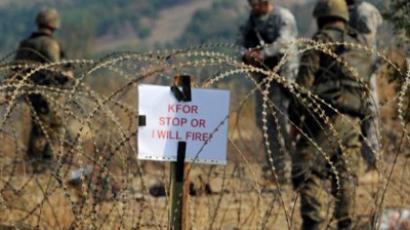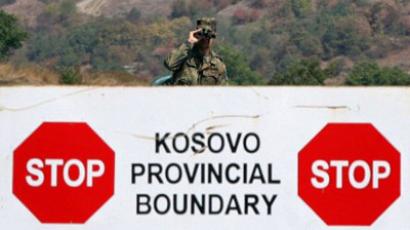Caged in: Kosovo Serbs barricade for freedom
For months, Serbs in Northern Kosovo have been putting up barricades against the hated Kosovo authorities as well as NATO peacekeepers. Little by little, they are growing accustomed to living in a cage of their own creation.
The barricades on the border are perhaps not an obvious venue for a wedding, but as RT’s Aleksey Yaroshevsky reports, one Serbian couple living in the Northern Kosovo town of Mitrovica has decided that this was where they would tie the knot. “We gathered together here and danced our joyful wedding dance,” says Dejan, a local resident who was among the guests. “This is our land and this is our way to underline that – Kosovo is Serbia.”The Serb barricades in Northern Kosovo have been standing for several months now. For those who built them, they are just a part of everyday life. Not only have the Kosovo Serbs isolated themselves from the KFOR troops, but also from their unwanted neighbors.The UN head has voiced concerns over a rise in attacks on the minority Serb population and their property in Northern Kosovo. Ban Ki Moon put part of the blame on the decision of the Kosovo Albanian leadership to extend its control over the predominantly Serbian area.The famous bridge in Mitrovica, which splits the town into Serbian and Albanian neighborhoods, was called the bridge of friendship and was meant to symbolize the good relations between the two sides. But the size of the barricades on the Serbian side now tells the whole story about their unwillingness to be part of the self-proclaimed state of Kosovo. While the cemented barricades in Mitrovica have become the town’s main gathering spot, tensions are still running high just a few kilometers away. For every Serb-built sand heap that KFOR troops manage to demolish, stubborn Serbs build two new piles. There are times when the two processes take place simultaneously.“We will protect our land with our bodies,” a Serb woman says. “We are the kind of people who never give up.”Serbs say they have no choice but to continue barricading themselves in: they believe the Kosovo Albanians would not hesitate to wipe them off their land – forcefully helped, they believe, by KFOR troops.
Getting used to life in a cage
Despite constant clashes with the NATO contingent and political pressure from Belgrade, the Kosovo Serbs have become accustomed to living in the cage they have built for themselves.“It was hard at first, when we ran out of food and petrol,” says Krstimir Pantic, mayor of Mitrovica. “But we Serbs are people who are used to improvising and finding a way out. We’ve built alternative routes through the mountains, so now we can again receive supplies. We have prevented a humanitarian catastrophe.”Father Milia, an Orthodox priest in the town’s brand-new temple, says he has never been busier, with all the people flocking in lately to pray for the wellbeing of their families.“Kosovo has seen a succession of hard times, even being occupied by Turkey at one point. But our monasteries withstood all those hard tests of time,” Father Milia argues. “And everyone in Mitrovica knows – this land is the cradle of Serb culture and statehood.”Meanwhile, the deadlock in this Balkan melting-pot continues. Belgrade remains unwilling to resume negotiations with Pristina which could put paid to this stand-off. But while politicians clash, children from Serb families live and play near the barricades, and even though they might be too young to realize what it is all about and why they are being shown the barriers, there is little doubt what views they will inherit once they grow up.














